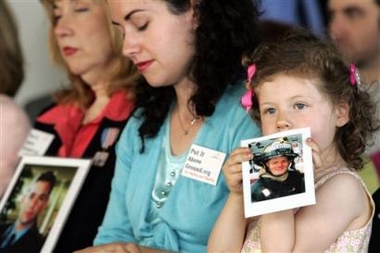Nearly two-thirds of the people who got counseling after the Sept. 11 attacks
are still grieving, and more than four in 10 still need professional help to
cope, according to a study sponsored by the American Red Cross.

A girl holds a photo
of her uncle firefighter Sean Tallon, as her mother Rosaleen Tallon-Da Ros
and Sally Regenhard, holding a photos of her son firefighter Christian
Regenhard, listen to testimony during a committee hearing on the status of
the redevelopment of Lower Manhattan and ground zero, Thursday, May 18,
2006 in New York. Firefighters Tallon and Regenhard died during the
attacks on the Worl Trade Center. Officials rebuilding the World Trade
Center site defended their progress Thursday to state lawmakers who asked
why no office towers had risen at ground zero nearly five years after
terrorists destroyed the twin towers. [AP] |
The study, released Friday, evaluated counseling, health services and other
aid the Red Cross Sept. 11 recovery program provided to thousands of family
members, first responders and others directly affected by the 2001 attacks. It
also surveyed 1,501 people who received Red Cross aid.
The Red Cross provided more than $700 million in assistance between 2002 and
2005 and has given about $90 million more since then to other nonprofit groups
that will provide services for at least another year.
Forty-three percent of those surveyed said they still need therapy, financial
aid to pay bills or other health services.
The executive director of the recovery program, Alan Goodman, said the survey
proved that those who lost loved ones or escaped death on Sept. 11 may be
permanently scarred.
For those who complained of post-traumatic stress disorder, he said recovery
could take "many, many years if there is recovery, if ever."
Sixty-three percent of people who received mental health services after the
attacks said that grief and anxiety interfered with their lives to a large or
moderate extent, the study said.
About three-quarters of the people who sought counseling said it helped them,
while two in 10 said they were unsatisfied, mostly because their aid didn't
cover enough counseling sessions.
The Red Cross said it planned to stop all of its indirect aid to nonprofit
organizations in the next year or two. One organization, the Mental Health
Association of New York City, has received more than $15 million in Red Cross
aid to counsel Sept. 11 survivors. Its programs are set to expire at the end of
2007.
About 12,000 people have enrolled since 2002, said Sanja Blazekovic, who
coordinates Sept. 11 mental health benefits for the organization. She said that
in the past six months, more civilians than first responders have enrolled,
upset about press coverage about the trial of Sept. 11 conspirator Zacarias
Moussaoui, rebuilding controversies and reports of a growing number of ailing or
dying ground zero workers.
The survey, prepared by the Washington, D.C.-based Urban Institute and
Princeton Survey Research Associates International, was conducted by telephone
between mid-July and mid-December in 2005, excluding a three-week period around
the fourth anniversary of the attacks. The margin of error was plus or minus 3
percentage points.